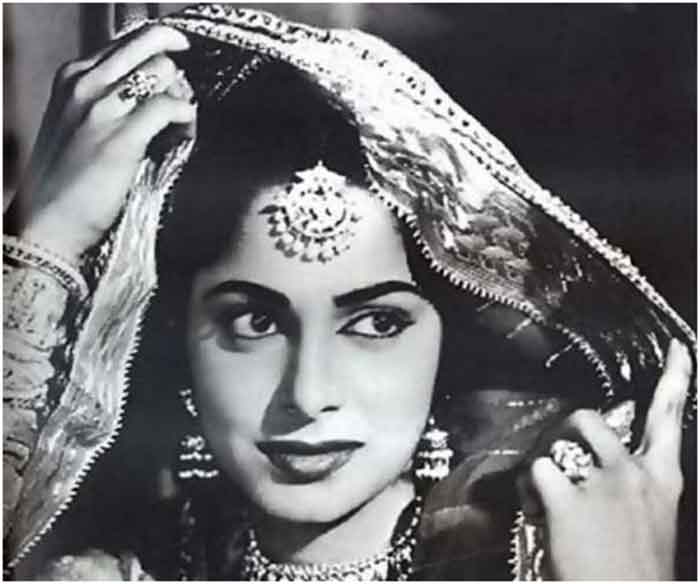
Actress Waheeda Rehman exuded grace in realms of the divine, reminiscent of a Greek Godess.Rarely has any Hindi film actress expressed such a degree of sensitivity, innocence, purity or simplicity. I hardly can find an adjective conveying how natural she was on screen. Her acting gave vibrations of reflection of moonlight in water or the twinkling of a petal of a rose. She had the talent or intensity to create the effect of a Tsunami with the sheer movement of her eyes or facial expressions. Rarely did an actress express conviction with such a magnitude of intensity. On the screen Waheeda was sheer poetry in motion. To add to this her acting also had an element of playfulness or mischief. Waheeda’s expressions could simply touch surreal realms. Few artists ever had more distinctive looks or as captivating expressions.
No actress on the Hindi screen played such a monumental role in shaping the classics produced by the directorial genius of late Guru Dutt to the extent of Waheeda Rehman.I do not proscribe any film actress of her time would have given Waheeda serious contention in the roles she portrayed in ‘Pyaasa.’, ‘Sahib Bibi or Ghulam’ and ‘Kaagaz Ki Phool.”She was also at her best in ‘Guide’, “Reshma aur Sheri’, “Teesri Kasam’ ,’Khaamoshi’ ,’Reshma aur Shera,” and ‘Neel Kamal.’ Her subtle expressions or histrionics in ‘Pyaasa’ when in love with a poet, her godly mannerisms or divinic posture in ‘Kaagaz Ki Phool’ as a girl whom a film director has fallen in love with, her morality and dignity in ‘Sahib Bibi Aur Ghulam”, her magical range of expressions in ‘Guide’ similar to witnessing colours of a rainbow, her sheer innocence as a dancing girl in ‘Teesri Kasam’, have shades of the touches of painter Rembrandt’s brush .. I also admired her sheer sensitivity in films of the 1970’s like Kabhi Kabhi’ and ‘Adaalat.’, playing the wife of Amitabh Bacchan. Even if her roles were not as commanding .she lost none of the touch of her heydays.
Similar to Nutan,with the least usage of histrionics, she conveyed her feelings. Even in a state of rage or deepest grief, Waheeda lost no element of her inner beauty. Rarely did an actress express conviction with such a magnitude of intensity.Waheeda lacked the joie de vivre ,bubliness or dynamism of Nargis or Madhubala but her sheer inner beauty and great artistic prowess more than compensated for it. She often conveyed the expressions of a woman unruffled in the gravest situations on screen.
Arguably the film world missed out on Waheeda Rehman co-starring more with stars like Dilip Kumar or Raj Kapoor.It could well be that Waheeda was such an institution to herself ,that the very essence of her art could have been lost in romantic hits, unlike the true classics. I really wish Waheeda could have been portrayed in roles as a crusader against opression, like Smita Patil. or Shabana Azmi.Her artistic talents would have come to the fore in roles of a woman confronting social oppression.. I wish she could have been given an opportunity to display her versatility to a greater degree.
Waheeda is in strong contention for a place for the best and most beautiful Hindi film actress ever. Some critiques found her beauty more appealing than even Madhubala. Perhaps we missed out on seeing as many character or path breaking portrayals of Waheeda Rehman like Nutan, Smita Patil or Shabana Azmi. Neverthless her memories will shimmer forever like an inextinguishable star. Not for nothing could she have won the love of a genius like Guru Dutt.
My selections of best films of Waheeda Rehman are
1.Pyaasa (1957) – Waheeda Rehman role as sex worker ‘Gulabo” is responsible for giving the poet Guru Dutt,his virtuosity and champions ethics or virtues of self-sacrifice herself. With most simplistic expressions or minimum histrionics she takes sensitivity to magical proportions. Even as a prostitute she exudes divinity. Enacting ‘Gulabo ’ she expresses love in divinic realms as though a new spirit was infused in her, after meeting poet Vijay. Here scenes when she first encounters poet Vijay, when she goes to get Vijay’s books published and when she bids adieu to the rest of the world holding Vijay’s hand in the climax rank amongst some of the most captivating scenes ever on the Hindi film screen. A brilliant portrayal of 2 virtuous characters uniting. As ‘Gulabo’ her character is in complete contrast to Mala Sinha as ‘Meena’ ,who sacrifices love at the alter, to climb up the social ladder.
‘Gulabo’ simply possesses the heart of gold.
Vijay is an unsuccessful, idealistic and disillusioned Hindi-Urdu poet in Calcutta whose works are not taken seriously by publishers or his brothers (who sell his poems as waste paper). Unable to bear their taunting that he is a good-for-nothing, he stays away from home and is often out on the streets. The publishers condemn Vijay for writing poetry on social problems like unemployment, poverty, etc rather than writing on conventional romantic topics. He encounters a good-hearted Tawaif (dancer) named Gulabo, who is enamoured with his poetry and falls in love with him. He also encounters his ex-girlfriend Meena from college and finds out that she has married a big publisher, Mr. Ghosh for financial security. Ghosh hires him as a servant to find out more about him and Meena. A dead beggar to whom Vijay gave his coat and whom he tries to save unsuccessfully from the path of a running train is mistaken for Vijay. Gulabo goes to Ghosh and gets his poems published. Ghosh does so feeling he can exploit the poems and make a killing. The poems are very successful. However, Vijay is alive and in the hospital after the train mishap.
Ghosh and Shyam, Vijay’s close friend, refuse to recognise him and he is committed to a mental asylum since he insists that he is Vijay and is thought to be mad. Vijay’s brothers too are bought off by Ghosh not to recognise him and a memorial is held for the dead poet. Vijay, with the help of his friend Abdul Sattar escapes from the mental asylum and reaches the memorial service, where he denounces this corrupt and materialistic world. Seeing that Vijay is alive, his friend and brothers side with a rival publisher for more money and declare that this is Vijay. At a function to honour him, Vijay becomes sick of all the hypocrisy in the world around him and declares he is not Vijay. He then leaves with Gulabo to start a new life.
Kaagaz Ke Phool(1959)- Rarely has any actress given a viewer as much an expression of classical beauty or art in mythical proportions..Waheeda as ‘Shanti’ projected romance as the lover of a film director with the beauty of a star sparkling. Rarely in classic has the sheer movement of an actress’s eyes conveyed the story. Most touching to witness the camera swoop down on Shanti who emerges as a star, after only coming to return a coat.
Chaudhvin Ka Chand (1960_ -Few stars ever looked more than a manifestation of the divine, being as expressive as a lotus blossoming in full. The setting is the city of Lucknow in northern India, where Islamic culture flourished. Two of the three best friends who live in this city have fallen in love with the same woman named Jameela. Aslam (Guru Dutt) and Nawab (Rehman) are the two friends caught in this love triangle with Jameela (Waheeda Rehman). An integral part of any Guru Dutt film, comic relief was provided by Johnny Walker, who plays Mirza Masaraddik Shaida.
Guide (1965) -Exuded grace in mythical realms as a dancer ‘Rosie’ rejected by her husband, and as a lover of a Guide enacted by Dev Anand.Her emotions have degree of contrasts like witnessing all the 4 seasons, with her inner beauty or balance not lost in the most critical times. I can never forget the scenes when she reprimands her husband for ill treating her and later disconsolate ,when she rebukes Dev Anand for corrupting himself and in the climax when bowing to the grace of the Guide, in his dying moments. Rarely has an actress in a classic Hindi film, make the plot revolve around her to the extent Waheeda Rehman did in ‘Guide.’ With mythical artistry portrays character of a woman who commits adultery, gives priority to her carer over marriage and bids adieu to her boyfriend when he starts to flirt with her.
In her role she projected the bondage of women at the hands of their oppressive husbands. It is symbolic that as dancer ‘Rosie’ she revolts against the rules of society, which literally subjugates women into being docile or submissive.
Teesri Kasam(1966) -A most subtle and sensitive portrayal of love in a classical chemistry with Raj Kapoor Even enacting role of Hirabai as a dancing girl , she exudes great morality and dignity. With artistic nuisances she portrays how stunned she is of Hiraman’s morality or ethics. Rarely have I witnessed more touching scenes at the conclusion or such sheer flow of an actress.
After nearly getting arrested, Hiraman enacted by Raj Kapoor promises to himself that he will never assist any black-marketeer nor transport bamboo. This incident does cost him his bullock-cart but he did manage to get his two oxen away in time. He manages to save enough money to buy another cart, and is hired to take a female on a 30-hour ride to a Mela. He subsequently finds that his passenger is an attractive woman, Hira Bai, and he falls in love with her – little knowing that she is a travelling courtesan – and it is this attraction that will get him into a physical altercation as well as in the bad books of Thakur Vikram Singh.
One night, Hiraman is asked to carry Hirabai (Waheeda Rehman), a nautanki dancer, as a passenger to a village fair forty miles away. As they travel together, Hiraman sings to pass the time and tells Hirabai the story of the legend of Mahua. As the journey progresses, Hirabai is mesmerized by Hiraman’s innocence and his simple philosophy of life. Hiraman sees Hirabai as an angel of purity.
Once they reach the village fair, Hiraman joins his band of bullock cart drivers and Hirabai joins the nautanki company. Hirabai asks Hiraman to stay at the village fair for a few days to see her dance. Hirabai arranges free passes for Hiraman and his friends to see the nautanki on every night for the duration of the fair.
As Hiraman attends the nautanki, he becomes aware that other people see Hirabai as a prostitute and this disturbs him. He tries to shield and protect her from society. As the days pass, the bond between Hirabai and Hiraman grows stronger. When Hiraman becomes involved in fights with local people who disparage Hirabai and her profession, Hirabai tries to make him understand that it is the harsh reality of her life. Hiraman asks Hirabai to leave her profession and to start living a respectable life. Hirabai refuses to leave. Feeling depressed, Hiraman leaves the village fair and returns to his village.
Hirabai meets Hiraman and tells him her secret that she had been sold and she was not a virgin beauty and then leaves. Hiraman then takes a third vow (teesri kasam) that he will never again carry a nautanki company dancer in his cart.
Neel Kamal(1968)-With great artistry portrays as the life of Sita and her past life to give the movie theme a cutting edge.Sita and her friends go on a trip. Sita sleepwalks and when she is about to be hit by a train on the railway track, Ram saves her. Impressed, her father decides to get her married to him.
After marriage, Sita discovers that her sleepwalking is not the usual kind, as it takes her to the story of her past life – Chitrasen, an artisan, was in love with the princess Neel Kamal (Sita in her past life). The king rejects his alliance for his daughter and buries him alive. Chitrasen’s love for Neel Kamal remained immortal and his soul survives for centuries to meet her. Sita is invited to Chitrasen’s burial by a song, where she sleepwalks to every night.
Khamoshi (1970)-She reflects talent of magical proportions when enacting a nurse entangled and torn in a love conflict .Waheeda Rehman literally catches the core of the soul of the audiences with heart touching expressions. Rarely has conflict or ebb and flow in love been projected in greater magnitude in a Hindi film. Intensity expressed in volumes of an inferno by Waheeda and mastery in dissecting characters.
Colonel Sahab (Nazir Hussain), a World War II veteran doctor, is head of psychiatry ward. Nurse Radha (Waheeda Rehman) in the same ward is heart-broken after a civilian patient, Dev Kumar (Dharmendra), whom she cured by pouring out her love and affection, left the hospital. She had been unable to keep her heart separate from her professional work and had fallen in love with that patient. Now Arun Choudhary (Rajesh Khanna), a writer and poet enters as a patient, suffering from acute mania after being rejected by his lover, Sulekha, a singer. After refusing to take care of him initially, Radha later relents. While caring for Arun, she reminisces about her past and tells a story of how she took care of injured brave army soldiers when she was posted in Ladakh during the Sino-Indian war of 1962.
Gradually, Arun is cured but Nurse Radha, yet again is emotionally involved with her patient. Unable to deal with her complex feelings, Radha becomes emotionally deranged. Ironically she is admitted to the same room of the ward. Colonel Sahab regrets that while he always saw a devoted nurse in her and omitted to see the woman inside her. Arun promises to wait for her recovery.
Reshma Aur Shera(1971)- Simplicity and character projection of high scale with one of the most natural exhibitions of acting. Reflects realism or social reality at the very core. Waheeda Rehman as ‘Reshma’ exudes the rebellious spirit against bondage in love itself.
Set against the backdrop of Rajasthan, Reshma (Rehman) and Shera (Dutt) love each other in the midst of a violent feud between their clans. When their families find out about their relationship, Chotu (Bachchan), Shera’s mute sharpshooting brother carries out his father Sagat Singh’s (Jayant) orders to kill Reshma’s father (K. N. Singh) and her recently married brother Gopal (Ranjeet). Unable to bear the grief of Gopal’s widowed bride (Raakhee), Shera kills his own father believing he actually pulled the trigger. After this tragedy, Reshma and Shera’s family’s feud will end in more tragedy as misunderstandings lead to more bloodshed between the clans.
Harsh Thakor is a freelance journalist. Toured India, particularly Punjab .Written on Mass movements ,,Massline,Maoism on blogs like Democracy and Class Struggle and frontierweekly .An avid cricket lover too who has posted writings on blogs like Pakpassion Indian Cricket Fans and Sulekha.com.
GET COUNTERCURRENTS DAILY NEWSLETTER STRAIGHT TO YOUR INBOX

















































